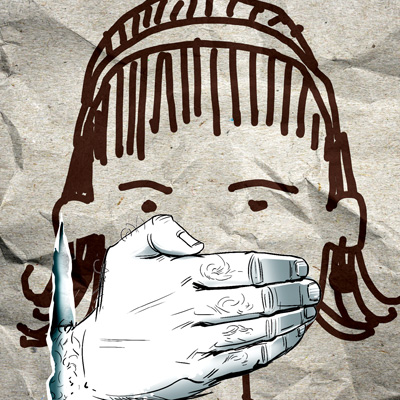The best thing about the newspapers is that they look fresh and new every morning without fail. May be that’s why they are called ‘newspapers’. But on that front I was a bit disappointed when I visited my hometown – Kanpur – this time after an interval of two months. The newspapers looked and read remarkably similar to what they looked and read like two months before. Did life freeze at Kanpur? Or was it the time that stood unprecedently glaciered? But things still seemed to move pretty much the same way otherwise. So, what was wrong? I looked closely and found that the names of the people involved and the places had changed, but the feel of the stories remained unchanged – oppressive and revolting.
She, a girl of 11 or 12 and a student of fourth standard at Gyan Bharti School, Kanpur, was brutally raped within the school premises by the son of the school’s manager on September 27, 2010. She was sent back home from the school, bleeding profusely. She died the same evening in the hospital. The police caught hold of a neighbour and did their best in turning him into the culprit despite the fact that he had nothing to do with the death of the girl. The DNA test absolved him completely and pointed at the real culprit. Loads of police foul-play was evident, which later resulted in the suspension of several officers with an inquiry initiated against the then DIG, Kanpur. The girl was Divya.
Around the same time there was another sensational story being relentlessly pursued by the newspapers. This was about the rape of a girl in the ICU of a private nursing home. A ward boy was promptly ‘nabbed’ by the police. The girl died the same day after a few injections were administered to her. The nursing home, its manager, her husband and her son-in-law came under the scanner. There roles in the death of the girl and the destruction of evidence was suspect. This was 18-year-old Kavita.
That was the look and feel of the newspapers when I was in Kanpur the last time over two months ago. When I was there again in January, I fund myself reading about the Sheelu case day after day. The 17-year-old girl was allegedly gangraped by an MLA of the ruling party, Purshottam Naresh Dwivedi, and his two close associates, Suresh Neta and Rajendra Shukla, after which they accused her of theft and handed her over to the police, who played their part by throwing her behind the bars without bothering about the Juvenile Justice Act. It was when the facts of the case found place in media reports and Allahabad High Court took suo moto cognizance of the matter that the girl was finally released. Even the Supreme Court issued notices to the government and the CBI after the matter was brought to its notice through a PIL.
Sheelu case was still very much on the front page of the newspapers when another MLA (from Bharthana) of the ruling party in UP was accused of raping and having the victim incarcerated – the same pattern of crime-and-cover-up emerged.
For the past year or so, whenever I was in Kanpur, the newspaper headlines and the general talk revolved around sexual offences involving the powerful and politically well-connected.
 There in Kanpur, it was Divya, Kavita and Sheelu; Back in Delhi, it was Ruchika, Priyadarshini and Jessica – the talk and the anger remained the same, only the victims and the victimizers changed.
There in Kanpur, it was Divya, Kavita and Sheelu; Back in Delhi, it was Ruchika, Priyadarshini and Jessica – the talk and the anger remained the same, only the victims and the victimizers changed.
Legislators, IPS officers, men with money, power and influence, and their sons and relatives – all of them thought that they could use, abuse and push around a powerless female at will and get away with it. What’s worse is that they almost succeeded.
On July 23, 2010, the Supreme Court did not find anything wrong in allowing a convicted rapist to become an IAS officer [S.L.P. (Crl.) No. 2506 of 2009]. The apex court appeared to agree with the Delhi High Court that the convicted had ‘redeemed himself’ by taking and clearing the UPSC examination while serving his prison term.
Regardless of the legal grounds on which the prison sentence was reduced by the High Court and the SLP dismissed by the Supreme Court, the message sent across was that we not only have molesting IPS officers, but also convicted rapists turned IAS officers because there was nothing in law to prevent the ‘tainted’ from taking UPSC examination and become IAS officers, just like nothing prevented the dacoits, gangsters and murderers from becoming legislators.
More recently, an educated young man attacked Arushi’s father, Dr. Rajesh Talwar, injuring him seriously. The same 29-year-old man, Utsav Sharma, who is a gold-medalist graduate in Fine Arts from Benaras Hindu University, had also attacked former IPS officer, SPS Rathore. Mr. Rathore, as we know, was found guilty in Ruchika molestation case.
The attacker’s father reportedly claimed that his son was suffering from depression and was not mentally stable. The claim has been readily and forcefully rejected by the authorities. Well, we might witness instances of such ‘temporary insanity’ more often.
Originally published as part of my monthly column — STREET LAWYER — in LAWYERS UPDATE [March 2011 Issue; Vol. XVII, Part 3]






